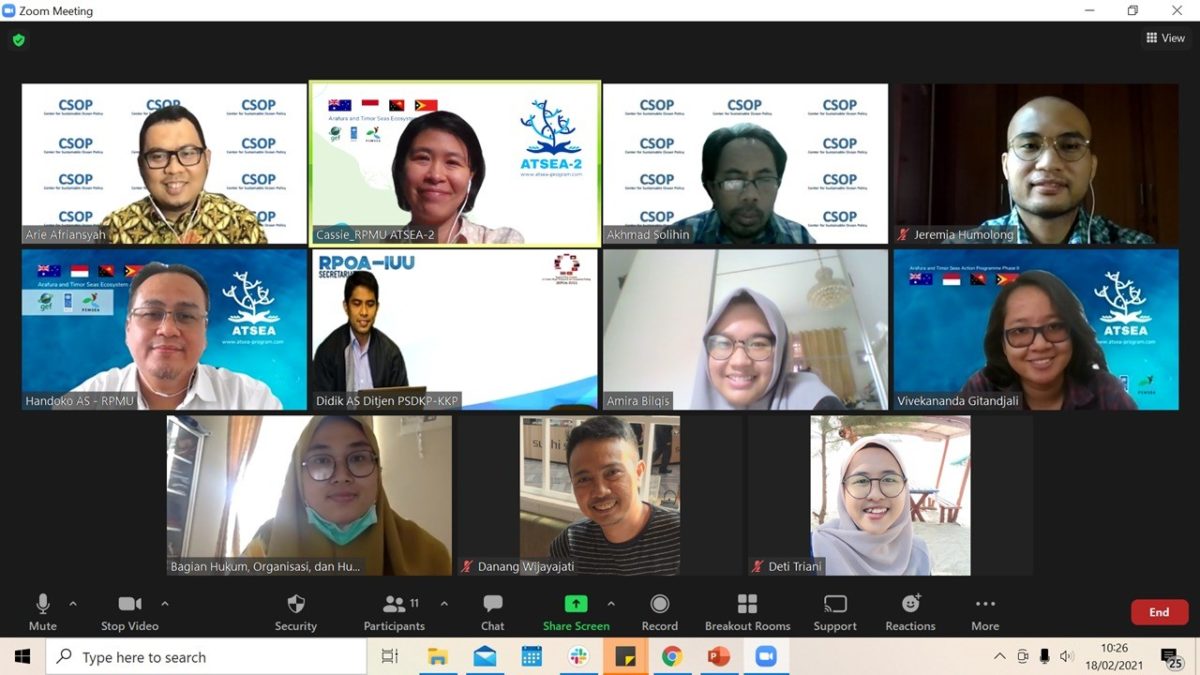
To ramp up the efforts on addressing Illegal, Unreported, and Unregulated (IUU) fishing, ATSEA-2 has committed to provide incremental support to better understand the drivers, trends, characteristics, and impacts of IUU fishing and to reduce IUU fishing in the Arafura and Timor Seas (ATS) region.
The baseline for the fisheries component and fisheries-related activities in the ATSEA-2 project is the Regional Plan of Action to Promote Responsible Fishing Practices, including Combating IUU Fishing in the Region (RPoA-IUU). The activities under the fisheries component of the ATSEA-2 project are designed to be consistent with the RPoA-IUU and the activities of the sub-regional group.
In close coordination with the RPOA-IUU Secretariat in Jakarta, ATSEA-2 with key support from a team of experts from the Center for Sustainable Ocean Policy (CSOP) – University of Indonesia led by Dr. Arie Afriansyah, joined a virtual meeting with Mr. Arip Hidayatulloh, Alternate Secretariat Coordinator and Mr. Didik Agus Suwarsono, Secretariat Member of the RPOA-IUU, on 18th February 2021. The meeting served as a platform to present the findings of the team regarding four different sub-topics, namely: (i) the value and volume loss estimates of the apprehended vessels for illegal activities in each RPOA-IUU participating countries; (ii) update of national policies and regulations in combating IUU Fishing; (iii) supporting efforts in developing tools for global record initiative; and (iv) collaborative surveillance best practices and lesson learned. Unlike other topics, the subject of this consultancy is RPOA-IUU participating countries for the first two sub-topics, while the others only encompass the ATS littoral nations.
Dr. Arie Afriansyah explained the initial findings on the estimated value and volume loss of the RPoA-IUU participating countries. Obtaining the data required to assess the three elements of IUU is still the main challenges. Therefore, the existing calculation still varied with Indonesia’s leading the data availability. In contrast, data from Singapore, Thailand and Vietnam are not accessible.
He also urged the participating countries to enhance traceability and data collection mechanism as the reference for the policymakers to apply more effective policy and strategy to eradicate IUU fishing. Further, there is an elusive development of their policy framework to a more transparent fishing vessel database and its compliance due to the disconnections in the jurisdiction of the complex problems within the IUU fishing activities.
The countries’ ability to collect a more sophisticated database will enhance its chance to participate in the FAO Global Record Initiatives. Dr. Arie also highlighted the importance of collaborative surveillance by empowering community surveillance groups (Indonesia), Tara Bandu and SPOT Tracker (Timor Leste) for countries with a high number of small-scale fishers.
The presentations followed by comments and recommendations from RPoA-IUU Secretariat members. The discussions recognized the team’s challenges in compiling information as RPoA-IUU reporting mechanism is voluntary, and the data in estimating value and volume loss contained sensitive information. Mr. Arip suggested looking at the FAO and CSIRO Report 2021 regarding the area’s updated IUU hotspots. The advisory bodies of RPoA-IUU have supported several countries in need of assistance and will continue to give inputs to participating countries. Additionally, Mr. Handoko also underlined that these findings are a preliminary study to be refined further. Through this meeting, CSOP attempted to confirm their findings to deliver the best available results for the upcoming report for ATSEA-2 Project.
(Arie Afriansyah and Amira Bilqis)


